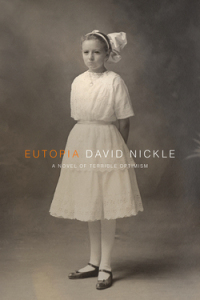Degrees of Freedom by Simon Morden
 Friday, May 27, 2011 at 11:16PM
Friday, May 27, 2011 at 11:16PM 
Published by Orbit on May 31, 2011
It has been about a year since the Americans destroyed Oshicora Tower and buried the Artificial Intelligence known as Michael beneath a pile of rubble, an event that occurred in Theories of Flight, the middle novel of the Petrovich Trilogy. World governments revile Petrovich, regarding him as a terrorist because of his conduct in that novel and the first, Equations of Life, while the residents of the Freezone regard him as their de facto leader, if not their savior. Now the Freezone’s actual leader, Sonja Oshicora, is at odds with Petrovich, who has discovered what appears to be a nuclear bomb in the Freezone, apparently an undetonated device installed by the Armageddonists decades earlier. (At last, the trilogy’s readers are given a meaningful glimpse of Armageddon’s cause.) Petrovich soon discovers that neither the bomb nor Sonja’s actions are what they appear to be, leaving Petrovich once more to take on the task of saving the Freezone’s residents from internal and external forces that threaten its destruction. Fortunately for Petrovich, he’s not acting quite so single-handedly this time, having assembled a loyal cadre of friends during the course of the first two novels, not to mention his wife, a deadly ex-nun.
In addition to the interesting question of how one builds a functioning, beneficial government that actually serves its people in the aftermath of Armageddon (a creative and intriguing problem I haven’t often seen science fiction address), Simon Morden takes on a more familiar theme, one that science fiction writers have tackled since at least the days of Asimov: what is the difference between a human and an artificially intelligent machine? Petrovich decides that Michael will have to convince the Catholic Church that a machine can have a soul. I thought it would have been fascinating to see that conversation play out; unfortunately, it all happens offstage. That disappointing omission makes the story seem incomplete, but that’s one of my few complaints about this surprisingly satisfying conclusion to the trilogy.
Morden delivers a nice blend of drama, action, and comedy in this novel. Where the second novel seemed to feature violence for the sake of violence, the action scenes in this one are more purposeful. The comedy that was overdone in the first novel and perhaps lacking in the second is more carefully balanced in this one: funny little bits pop up here and there, my favorite being a character (Tabletop) who amuses herself by molding Petrovich’s plastic explosives into animal figures. I was also fond of the character Valentina, a Russian whose zeal for revolution leaves her itching to foment an uprising against the Freezone’s oppressors (she makes sure her followers are supplied with red flags, because it’s the “traditional color of such occasions” and “doesn’t show blood”).
It’s not that often I come to admire a fictional character, but Petrovich is a truly admirable creation: a self-sacrificing hero, an idealist who refuses to be seduced by power and fame. Petrovich is the kind of unwilling leader we wish for in the real world: someone with the wisdom to exercise power nobly for the betterment of society before standing aside to let everyone else do their part. He’s a character of sufficient complexity to experience guilt about the consequences of his actions without feeling remorse for doing the right thing. He gives a speech toward the novel’s end about how he’s changed because of the events described in the trilogy, how he’s learned to be unselfish, to value his friends and to be a reliable friend to them, but it’s clear that Petrovich had integrity from the start, and it’s his integrity, his consistent refusal to take the easy path when he doesn’t feel it’s morally correct, that makes him so interesting.
Perhaps us Yanks should be disturbed that Petrovich characterizes Americans (or maybe just the members of the administration that rose to power after Armageddon) as “a bunch of nuclear-armed fundamentalist xenophobic psychopaths” but there are, after all, some American politicians who fit that description (and some Brits as well). I don’t mind that Morden made the United States the baddest power on the planet, but Morden’s version of an American president made whacky by religious zeal is a stereotype we’ve seen many times. That’s a minor quibble, though, and I actually liked the scenes in which Petrovich gets payback against the United States in a relatively nonviolent way.
Ultimately, I think this is the best novel of the trilogy. I doubt it will make such sense to readers who haven’t read the first two, and so (despite my criticisms of the second novel, a book that in restrospect seems like filler designed to bridge the first and third) I recommend reading them all. It’s great fun and not quite like anything I’ve read. If Morden wants to give us more Petrovich stories, I’ll read them. (Minor point: If Morden does publish another Petrovich novel with Orbit, he needs to convince Orbit to lay out some cash for real cover art. The geometric designs Orbit came up with give me a headache.)
RECOMMENDED



